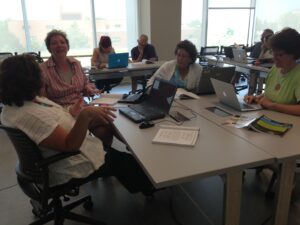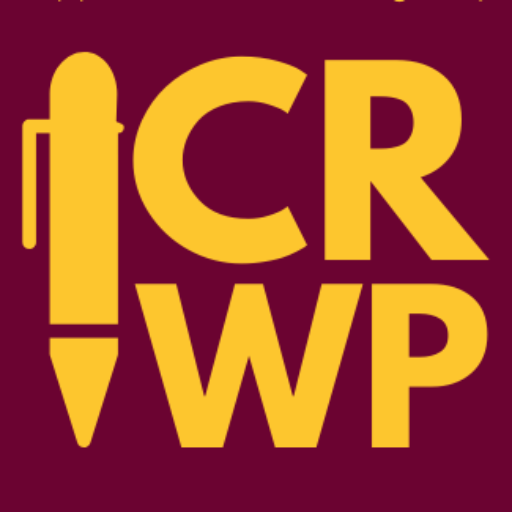
“Resistance is futile.” So says an ominous voice from a Star Trek movie, and so I said to myself as I read the syllabus for the Chippewa River Writing Project summer institute, which I attended last summer. At the CRWP institute, you see, we would be required to implement…(insert dramatic, suspenseful music)…DIGITAL WRITING TOOLS!!!
When I graduated from college, the only device I used for writing was a typewriter. I preferred pen and paper, to be quite honest. Still do.
So when Dr. Hicks invited me to participate in the project, I eagerly hesitated: although I was eager to practice my craft, I was hesitant because I was certain the digital aspect of the course would overwhelm me.
My immersion into the digital age has been a slow one. Picture fat, black ooze gurgling beneath the surface of the earth, or a snail striving to complete a 5K. Yes, that slow. Five years ago, after taking many years off to raise a family, I returned to college to renew my teacher certification. One of the requirements was to take ENG 315: Teaching Writing in the Elementary Classroom. As fate would have it, Dr. Troy Hicks was the professor, and he guided me through what most students take for granted: university links, Google, and wiki pages. I was terrified and continued to resist many of the digital options presented to me. Thanks to the class, my writing instruction improved, but my technical expertise remained minimal. This “old dog” was, of course, only so interested in “new tricks.”
A few years later, however, I was blessed to have Troy oversee an independent study on writing and writing pedagogy. Once again, Troy presented digital opportunities — and this time, I was more open to suggestions. Since I now had my own classroom, Troy assigned digital projects in bite-sized chunks that allowed me to find new digital writing applications on my own, try them with my students, and reflect on their usefulness. From Piclits, Kidblog, my very own website, and Google Reader (RSS), I learned that children adore blogging, commenting on their peers’ writing, and using digital pictures to prompt their story-telling or poetry creation. In a reflection piece, I wrote:
Simple, straightforward, and unintimidating to the digitally naive!
…my students are showing enthusiasm for writing, where they didn’t before.
…with my limited expertise but willingness to tackle technology, I am committed to taking steps to make the digital writing workshop an integral part of my curriculum. They might be baby steps right now, but I am moving forward, slowly but surely.
Shortly after completing the independent study with Troy, I applied to the 2013 Summer Institute of the Chippewa River Writing Project. I was accepted. I read the syllabus. The Borg had found me. Resistance was, indeed, futile. I metaphorically threw up my hands and entered into the fray. To my surprise and to the credit of Troy and many new colleagues, the days I spent with the CRWP were a joyful reminder to me about what I love most about teaching — learning something new every day! Using Writing into the Day, mini lessons, teaching demonstrations, book studies, and small group discussions, I reclaimed my writing voice and desire to be, not only a better writing instructor, but also an author in my own right.
Writing into the Day was a gentle nudge to put something, anything, down on paper (or screen). A facilitator would present a thought, quote, or idea, and encourage us to expound upon it. We gathered ideas and responded to peers. The facilitator wrote with us, modeling a vital tenet of writing instruction: a teacher must write beside students, modeling, mentoring, struggling, and sharing. Writing into the Day made this happen.

During the Summer Institute, all participants observed, presented, discussed, and responded to a myriad of literacy lessons. These teacher demonstrations ranged from first grade research ideas to secondary lessons on character development. One participant presented a lesson, and the rest of us acted as “students.” One particularly stuck with me – a first grade non-fiction inquiry lesson. The demonstrator contended that writing while reading helps students to be active readers, and that there is value in teachers modeling their own thinking while writing. The process by which this teacher “modeled” her thinking while she read aloud and wrote on paper was not a new concept. Rather, it reinforced the necessity to model for students what we ask them to do. We should only require what we are willing to tackle ourselves. Hmmmm…
The Institute’s focus on digital literacy tools, of which I was, at first, reluctant, turned out to be relatively painless. Perhaps because they were introduced in small doses, or perhaps because many teachers were struggling right beside me, I did not feel completely overwhelmed and alone. I was able to experiment with Glogster, an online poster-creating website. Toondoo showed us possibilities for carton creation. We contributed to “shared” documents through Google Docs, which I had never done before. We also were required to use a wiki page.
The most exciting digital tools for me during the Summer Institute were Movie Maker and Audacity. As we explored Troy’s book, Crafting Digital Writing, I focused on the chapter regarding audio texts. The use of ambient music underscoring a text helps set the tone for an entire piece. And the voices chosen to read a text create a personality for the characters. With these tenets in mind, I crafted my first digital story. I was intentional about which music I would choose to underscore the words. And because my story was about my dad, I actually used his voice to read the text.
Using digital elements helped the story take on a vitality that made the process and the product feel more polished, more complete. I believe that young writers would feel the same way — why wouldn’t I want to give my students these same opportunities?
The Summer Institute reinforced what I had already begun to realize through my experiences with ENG 315 and my independent study: if the digital age is upon us — and we all know it is– then teachers will find a way to use technology to help their students grow as 21st century learners. If I am committed to teaching, using the best resources available to me, then I must assimilate. It might not have been my first choice in the beginning, but my reluctance has morphed into readiness.
I have come to realize that the good aspects of digital tools outweigh the bad. And the “good” is really good. And educators still agree that the core of writing instruction has not changed. My old-fashioned heart rejoices with these unyielding truths: writing must be personal. It must matter. There must be a purpose. Authors need to collaborate.
The beauty lies in the fact that these core beliefs can now be enhanced with other forms of beauty that can be shared and created by our student writers. Digital tools provide a bridge for many who fear the empty page. If a teacher uses digital technology, the paralysis suffered from “fear of getting graded” gradually disappears, replacing timidity with courage. Writers can move from resistance to reluctance, and reluctance to readiness. I know it can happen, because it happened to me.
 Julie O’Brien (@teachingdazy) is a third grade teacher at Sacred Heart Academy in Mt. Pleasant, Michigan. She was a part of the CRWP Summer Institute in 2013 and now serves as a teacher consultant.
Julie O’Brien (@teachingdazy) is a third grade teacher at Sacred Heart Academy in Mt. Pleasant, Michigan. She was a part of the CRWP Summer Institute in 2013 and now serves as a teacher consultant.

This work is licensed under a Creative Commons Attribution-NonCommercial-ShareAlike 4.0 International License.

Leave a Reply
You must be logged in to post a comment.